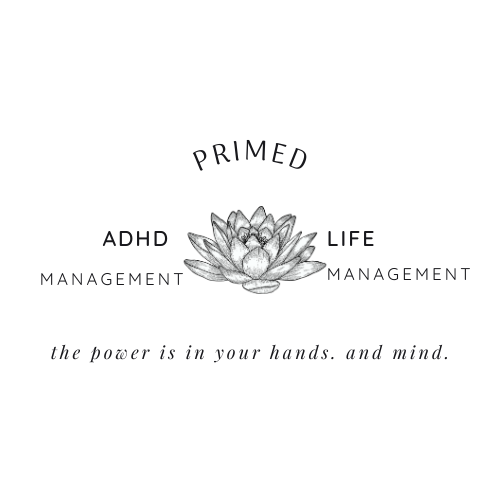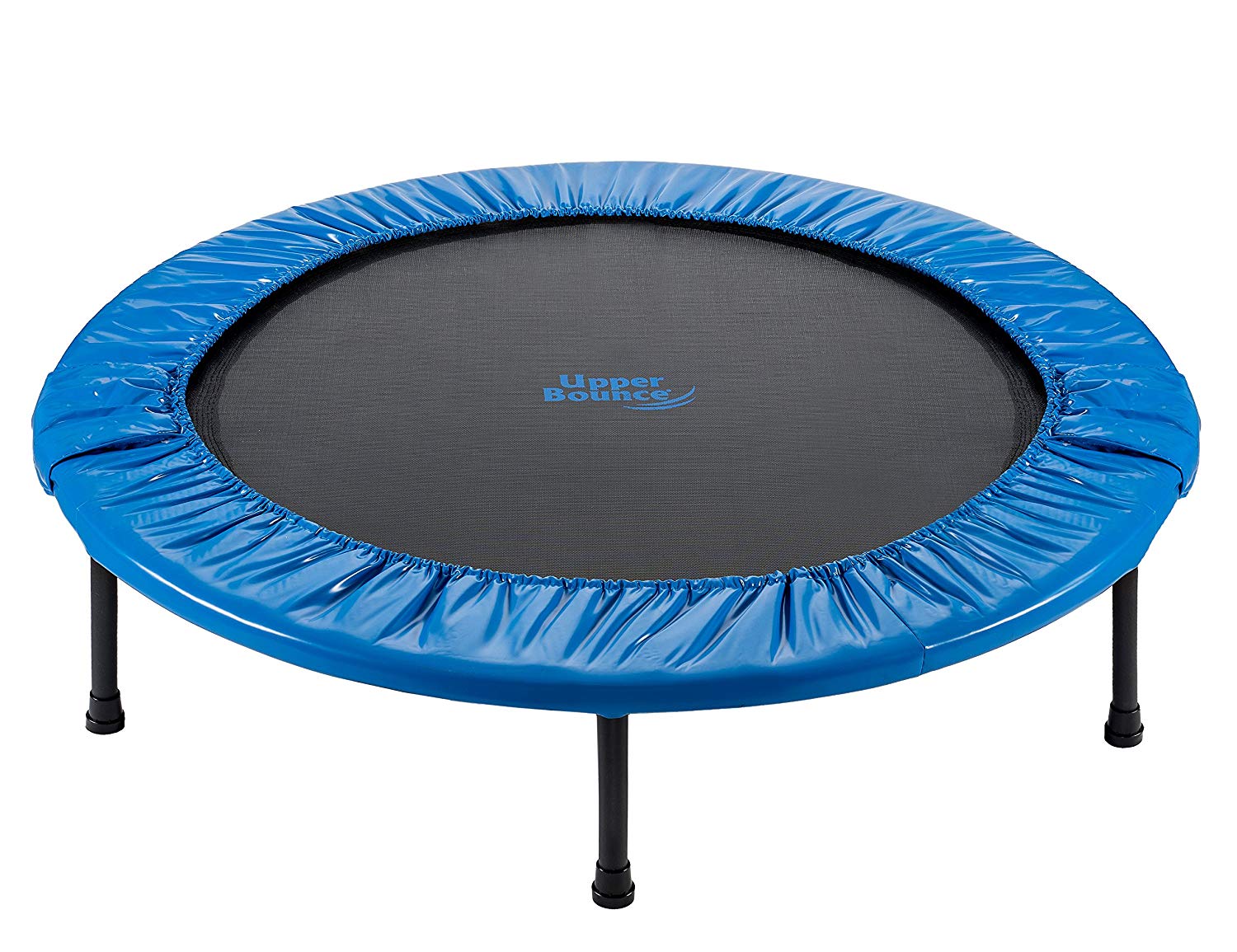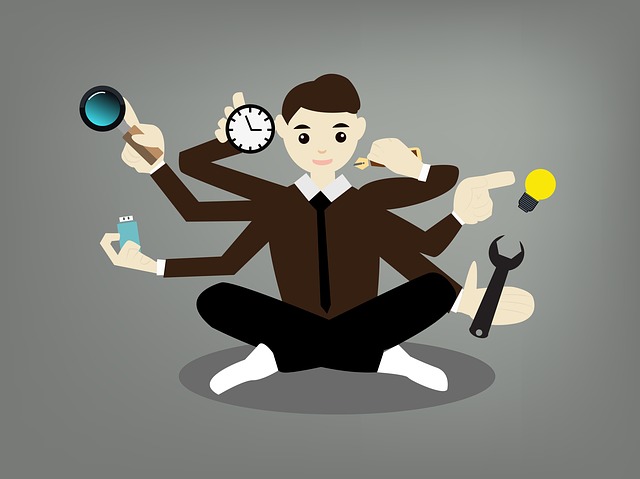October is ADHD Awareness Month & now that I’ve got some time, I want to tell my story. Although a lot of this is in the About page of this website and elsewhere, I wanted to create a blog post to share my ADHD journey & what lead me here, and I want to talk about why I created a program to help people with ADHD. I’ll share a modified version of this on Medium.
(And yes, I realize that this 16-minute read isn’t ADHD-friendly.)
Childhood hyperactivity
I was a hyperactive child, always bouncing around. I couldn’t sit still. When my parents bought a mini trampoline for the basement, I bounced while I watched TV. I bounced when I needed to focus. I bounced when I needed to relax. Bouncing was stress relief. Bouncing seemed to have a positive effect on my nervous system. Years later (in the last two, in fact), I’d learn that exercise is proven to improve focus and concentration. Anecdotally, a lot of runners say that running helps them relax.
I kept breaking springs on those trampolines, and my parents kept exchanging them at Consumers Distributing.
[An aside: If you’re above a certain age, you know Consumers Distributing. A quick Google search tells me that the company was founded in Toronto but at some point had stores across Canada, and the U.S. What I remember most is one particular location, and the catalogue. Wikipedia reveals what my memory doesn’t: There were two main catalogue launches per year, with seasonal mini-catalogues issued more frequently to highlight specific items. The entire line changed twice a year with few exceptions. New products were introduced only with a new catalogue.
Every time I found a new catalogue on my doorstep, I’d thumb through it and make a mental wishlist as if there was a Jewish Santa who would fulfill it. It was like a vision board for 8-year-old me – or however old I was.]
My trampoline bouncing habit didn’t end when I left childhood. I used that thing until I moved out of their house at the age of 19. My parents have managed to keep a mini trampoline intact for several years now.
My natural state was to bounce, even in place. Some people called me “Mexican jumping bean.”
At a family gathering, last winter after the funeral of my 98-year-old grandmother (98 is a great age, sad but not tragic), an older relative that I hadn’t seen in a long time exclaimed, “I still remember when you used to bounce around all the time!”
As an adult, there are times when I need to bounce, or dance it out, or run. I drum on things when a song comes on. I chair dance and car dance. (Doesn’t everyone? I don’t think that the last three are ADHD-specific.) The weird thing is, running isn’t my preferred activity. I’ve been doing it on and off for years, but I don’t like the feeling of my chest tightening with effort. I do enjoy running with beautiful scenery and moving my body. I love the sense of accomplishment after a run. It feels great to make progress and acknowledge, “Today I ran # minutes without stopping!”
I started running again last spring after many years off and progressed quickly. I’m more into long walks. Fresh air and moving my body helps give me ideas and clarity. It’s as if I’m in conversation with God, or my inner self when I walk. Having a dog makes walking a requirement.
School
I wasn’t the best student but found that I did best in subjects I was interested in – which is a common ADHD trait. In grade 7, I got the best grade in the class on an assignment that I enjoyed a lot. After handing me back the project, my teacher suggested that I consider a career in writing. Writing has been a near-constant for me ever since.
All through school, I waited until the last minute to work on projects. I was a procrastinator. Sound familiar?
With undiagnosed ADD I developed coping strategies based on how I saw people around me act and based on intuition. I think that on some level I thought I wasn’t “normal,” so I looked for “normal” models.
Before anyone had laptops – not everyone had a desktop PC in the 80s and early to mid-90s either – I developed studying strategies that worked for me. I still use these strategies to this day.
I remember sitting in the public library next to my high school taking notes from textbooks and rewriting some of my class notes. I would highlight with different coloured highlighters. I’d annotate and use those multicoloured Bic pens. I’d put asterisks in margins. Those studying methods helped me retain information. When I needed to avoid the distraction that often comes with communal library tables, I’d go into those little cubicles with walls.
I continued this strategy in University, also using my desktop computer. (Again, no laptop to take notes with in class. Kids, our hands cramped up a lot.)
I did ace some tests based on those strategies.
Walls are still essential to me as you’ll read further down where I talk about my ideal environment for working.
Sensitivity
I was also a highly emotionally sensitive child with sensory issues. I can better regulate my emotions now unless I’m tired or hungry, then I sometimes act like an overtired four-year-old having a tantrum. People with neurological conditions tend to have sensory perception issues.
Examples of sensory sensitivity:
I can’t handle hearing more than one conversation at a time. Some people can simultaneously listen to music and watch TV. Doing so causes me anxiety. If two people are talking at me at once, I ask them both two stop and take turns.
For years during childhood, I lived in sweatpants because the waistband of regular pants bothered me. I didn’t like tights, and I’m still not a fan. To this day, I’m most comfortable in yoga pants and a t-shirt. Bras with underwire make me physically uncomfortable, always jabbing at me. I live in sports bras. When I have to “dress up”, I wear bras from Knix.
Emotional sensitivity
I’m an empath. I feel other people’s emotions. And when I think I’ve hurt someone, offended someone, or pissed someone off, it stays with me. THAT is the ADHD way.
My early 20s & natural treatment
When I was around 20 years old (I’m in my 40s now) it was suggested to me by a medical professional that I had ADHD. I’d heard the word before and had vaguely considered it, but at this point, it all suddenly became clear.
After my ADHD came to light, my aunt subsequently advised me to read the book The A.D.D. Nutrition Solution: A Drug-Free 30 Day Plan by Marcia Zimmerman.
It changed my life.
I remember a moment after I’d been following the advice of the book for a month or two: I was in a job interview and held eye contact with the interviewer. Maintaining eye contact was a significant achievement for me. My life changed when I started on a regiment of essential fatty acids and started eating more fish (among other recommendations).
Once I solved the nutrition piece of the puzzle I gained an awareness of the connect between mental health, brain health and body health. We are one unit, separate body parts and systems functioning together.
Along with ADD, I experience bouts of depression. My brain health is a constant challenge, and I need to stay on top of it.
Eating Right
My ADD and depression are worse when I’m not consuming enough fat. These days I eat based on a modified ketogenic diet. I called it “modified” because I focus on the principles without counting macronutrients and allow myself the occasional piece of cake or challah. I’ve been stricter on the keto diet since my partner went keto back in early summer.
When I was at a family gathering where there were bagels, I ate half of a bagel instead of three whole bagels. This is significant. While I’m hardly a carb addict nor will I seek out bagels on a regular basis I usually can’t resist fresh bagels if they are in front of me. I’m a Jew. I take bagels seriously. The warmth and softness of a soft bagel, sometimes with a slight crunch on the outside – depending on which bakery they came from – is magical. The battle between Toronto, Montreal and New York bagels is real, people.
(And can send me on a substantial tangent.)
Eating lots of good fats and minimizing sugar and other inflammatory foods is crucial for brain health.
I have a whole keto series that have planned for my blog, but there’s so much to it that I keep getting overwhelmed. (Seriously, I want to write a book about the keto diet and brain health and probably have enough material for an outline. So much of the “keto” material out there is about weight loss.)
Most recently – the job that inspired me
I started a new employment contract in March 2017, four months after my previous contract ended. Both my ADHD & depression flared up in this job, and quickly. After I’d been in the role for three days my boss left for a week without providing information about the company, stakeholders or processes. I knew the technology, but I didn’t know the people or systems. It wasn’t fair, and I messed up because I didn’t know what I didn’t know. I was still learning. No boss should put an employee in that position. I hit the ground running the best I could but not knowing to whom I was accountable and who my colleagues on other teams were (who do I contact and for what?) made things difficult. I made decisions based on the information I had. I asked questions to people who were available to answer them.
By the end of the first week, I knew that the job wasn’t going to work out, and this realization resulted in stress that contributed to poor mental health.
I stayed, and that’s my responsibility. As you read below I don’t want you to think that I didn’t take responsibility for my happiness or that I’m playing the victim. I felt that I was doing the best with what I had. However, it’s not simply a matter of thinking positively. Taking it day-by-day takes courage and energy and I made it through.
Until that first week of employment, I’d felt “normal” for some time. Quickly, past mental health issues returned. My depression had been around recently enough for me to remember it, but I had forgotten about ADHD symptoms that were under control. Sometimes it’s easy to forget about an injury in the absence of pain, and then you put pressure on that part of the body again, and “ouch.”
It got so bad that I told my boss and my contact at the staffing agency that recruited me. I’d never addressed it at a job before. I’d always managed using my tools, and my symptoms lay mostly or entirely dormant. My ADHD had rarely been an issue. I coped, privately. It was a job in my early 20s that lead to my diagnosis.
It wasn’t just the stress of the job; it was that I wasn’t taking care of myself.
Nutrition (lack thereof)
I’d been off work for four months, and so I lacked income. With a lack of funds, I wasn’t taking care of myself. My supply of supplements ran out, bottle by bottle. I wasn’t eating a healthy amount or taking in enough of the nutrients I needed. Without a regular schedule, I forgot to eat. I was stressed out mentally and emotionally and not eating was stressing out my body more. I may have been malnourished.
So, I started a job with a health deficit, one that stressed my body. Had I begun the contract with a healthy body and a healthy mind, other work-related issues may have been more manageable, and I might not have found myself crying in the morning before I went to work, really not wanting to go in.
Yeah, that happened. I remember sobbing while walking the dog, hoping that I wouldn’t run into other dog owners I knew.
Mental manipulation
I had a boss who was a lovely man in many ways but had that “kick the puppy” thing going on, taking his stress out on his direct reports. I never knew what sort of day I was in for.
I later realized that he gaslit me. A friend made that observation to me after I made a filtered Facebook post about one incident, but I didn’t believe her. The realization came later.
He would sometimes ask me, “Don’t you think that…?” as if I was supposed to agree with him and as if he was trying to teach me a lesson. Sometimes his question might have been asked out of genuine curiosity. Maybe this is an incorrect perception, but it often felt like a trap. For example:
During an email interaction that I had with a U.S.-based colleague one late afternoon, a conversation that my boss was a part of, my boss privately messaged me and asked, “Don’t you think you’re being culturally insensitive?” Maybe he was truly curious about what I thought, but I interpreted it as the observation, “You’re being culturally insensitive.” It sounded like an assault. I felt that there was no “right” answer here. I felt that the man who tried to keep me from being steamrolled by others was steamrolling me and did so on multiple occasions. It wasn’t always “for my own good.”
That question from him – interpreted as a negative judgment – sent me on a downward spiral of anxiety, panic and obsessive thoughts that lasted through the evening and the next day. During this incident, he demanded that I apologize to our colleague as if I was a young child whose father learned that she’d stolen a chocolate bar from a store. It turns out that the colleague who I’d potentially offended thought that my comment was harmless and amusing. The colleague was confused by my apology, issued through multiple emails that I scrambled to write in my panicked state while my boss scolded me.
Sometimes when he asked “Don’t you think…?” my ego wanted to yell, “Fuck you, I’m in my 40s and have been working for over 20 years.” One time I provided an answer that he didn’t like and my response was, “I considered telling you what I think you want to hear, but decided to be honest,” hoping that he’d value honesty. Sometimes I told him what I thought he wanted to hear because honesty isn’t always best and as adults, we hopefully have the good judgment and awareness to know when to be 100% honest and when not to be.
Another time, he questioned my grammar. I’m a grammar nerd. When I’m not sure if my grammar is correct I look it up. I also use Grammarly with every single piece of writing. I think it was the tone of his query that bothered me. It wasn’t genuine curiosity (such as, “Are you sure that’s written correctly?”). He directly told me that I was wrong. I disagreed and offered resources to support it.
On the other hand, after I told my manager that I had ADHD and that it was affecting me, he tried to advocate on my behalf. He claimed that he wanted to help me succeed, to be the “rockstar” he knew I could be. It seemed strange that he claimed to want me to succeed but sometimes made me feel like shit.
The fact that I recall all of these details indicates the strength of their impression.
But, I often didn’t get the information I needed to succeed. For example, an email that I thought was an “FYI” because it lacked details or a request of me was revealed three weeks later as something on which I was to take action. This reveal happened after the action was to be taken. I knew nothing about the context. One of my boss’s colleagues came down on him. He claimed that her irritation was my fault.
A colleague directly involved with the project assured me that it was not my fault because no one kept me informed, and she apologized repeatedly for not adding my name to a particular email list and connecting me with the people who would have kept me in the loop. Big corporations, you know. She agreed that the aforementioned email had no indication that I was to take action. (My boss continued to insist that it was my “fault”.)
I often disagreed with my boss. He hired me to be an expert – my job title had “manager” in it. I’m a subject matter expert and in the past had mostly been given respect as one. My recruiter once asked me, “Well, why can’t you do things the way he tells you to do them?” The answer, which I didn’t give: “Because I want to do what’s best for the company. I’m an expert, and they need to trust me. He’s wrong.” I felt that they should have hired a new grad with little experience that they could train, not someone with decades of experience.
Other people have disagreed with him, but their foot down, and had him concede. I didn’t seem to have that fight in me.
I remember during one 1:1 meeting being asked in an exasperated tone, “Is this a part-time job to you??” I have a physical memory of my response. I recoiled at the suggestion and shot back, “No!”
Right now I can recreate the neck movement, the eyebrow furrow and the slightly pursed lips.
My entrepreneurial work was part-time. The corporation got me from 9-5. Sometimes 9-6. Once, 9-8. (Though on multiple occasions it was pointed out to me that I wasn’t getting paid for those extra hours and that therefore my extra hours were voluntary, and I should be able to get all of my work done within a regular work day, but there’s nothing that could be done to encourage that.)
But at times he could be so supportive.
Environment
Environment — or surroundings — plays a significant role in ADHD symptoms.
Picture it: An open-concept office. Fluorescent lights. A neighbouring team whose job function requires phone meetings several times a day, but additionally, a lot of them had personal conversations with each other while I was trying to work. I once sat unfocused for 45 minutes while a group of young women discussed The Bachelor. It might have bothered me less if they were discussing … say… Game of Thrones, but it might have bothered me the same.
Furthermore, two interns spoke with vocal fry, and they had regular conversations about non-work things, all the time. As someone with sensory perception issues, vocal fry drives me nuts. While I wanted to yell at them to shut the fuck up, I once asked them politely to please take their conversations elsewhere because they were distracting me.
You can read about one such incident here.
The environment was hell for me, and because it manifested in depression, I didn’t have the energy to look for alternative forms of employment.
On open concept offices
I don’t mind open-concept offices as long as I have at least one wall. Not having a wall even in front of my computer to pin things up messes with my organizational system. A lack of walls makes me feel so exposed. I have nothing to hide, but I need to screen myself from co-workers to be productive.
Remember way up this article when I said that when I was a student, I needed to work in a cubicle? Some form of physical barrier is essential to me. I like cubicles, but I’ll accept one wall at a minimum. Let me hang a calendar with visual reminders. Let me hang important information. I don’t need to personalize my space; I need to organize it.
People with ADHD require organizational systems. Just yesterday I (briefly) got irritated because some boxes at my restaurant were labelled “random glassware”. There was no specific way to know the contents each box without opening each one and looking.
I took a Sharpie and a piece of tape to one of the boxes to remedy that.
But I digress…
There are many studies against open-concept offices, and I’m sure that there are many cases for it, but due to my own confirmation bias, which I fully acknowledge, I tend to look for, read and share articles and studies that present evidence against them. A while back I highlighted the following in a Medium story called, “The open-plan office is a terrible, horrible, no good, very bad idea“:
The absolute worst is when you have dozens of people from all different departments in the same room. Sales, marketing, support, administration, programmers, designers, what have you. These departments have very different needs for quiet or concentration or use of phones or open conversation. Mixing them together is peak bad open office design.
Here’s a snippet from an article called “Why open offices are bad for us” on the BBC website:
There’s one big reason we’d all love a space with four walls and a door that shuts: focus. The truth is, we can’t multitask and small distractions can cause us to lose focus for upwards of 20 minutes.
Twenty minutes! Imagine lots of small distractions. Imagine 45 minutes of Bachelor talk. Imagine the resulting anxiety. In the paragraph above the Environment heading above I mentioned that sometimes I worked late. A lack of productivity from distractions contributed. Distractions weren’t the only reason I worked late, but they often were the reason.
Everything happens for us, not to us
It’s been ten months since I left my 2017 role and just thinking about it pisses me off because there’s a part of me that feels like I was set up to fail. Had I been a permanent employee, I’d have had access to mental health programs. As a contractor, I did not. You can read more about it in a blog post I wrote in January on Bell’s Let’s Talk Day, a mental health awareness day.
However, it was a good experience because it happened. I was grateful to be there, and I’m grateful that I survived. I’m grateful that it inspired me. I’m aware that my experience could have been worse. Not that my anxieties at the time were any less valid than someone in a “worse” situation (one of my regular sayings is, “negative experiences aren’t a pissing contest”) but I did some productive work. I satisfied requirements. I gave solid advice. I did the best with what I had. I made a couple of friends. I developed more skills and experience in one of my fields. (I’m a social media & content manager, and a restaurant owner and an ADHD Coach.)
Except for the loss of income, leaving that place was a massive weight off my shoulders.
During those difficult months, the mornings after I worked on my business and my system I went into work feeling good, and strong, even if I’d worked late into the night.
Not a business pitch, but sort of a business pitch
Those good feelings lasted until I was triggered again. I tried to start each day positive, but there were imbalances in my internal and external life.
Those imbalances formed the basis of the PRIMED system for ADHD management that I created. I looked back on previous office jobs and compared them to where I was now. I realized that if I could make changes to rebalance things, I’d feel normal again and be able to cope and thrive.
In other words, when I realized that I was having a terrible ADHD flare up, and I realized why, and I realized what I could do to manage it, it inspired me to create a program to help others like me. There are things we can control and things that we can’t. Some things are easier to control than others. There are internal factors and external factors.
If it worked for me, and it had in the past, I should be teaching it to others. I should be shouting it. As a natural helper and nurturer, I want to help others help themselves. I want to empower people.
The inspiration to become a coach/mentor is an example of things happening for us, and not to us. This is making lemonade out of lemons, baby. When I persued certification as a Transformational Nutritionist, I thought I’d use it to give credentials to my writing. The idea of coaching others 1:1 didn’t appeal to me – until it did. I even had a vision of myself up on stage giving a talk about my system, and I hate public speaking.
I’ve helped some people through coaching but haven’t been focusing much on it recently. My attention has been elsewhere. I have some ideas for the business, but I think they will take a couple of years to execute fully. The business idea came to me when I needed it. It helped me.
If you have ADHD, reach out to me. Comment below. Ask about working with me, or don’t, but share your experience instead. We’re all in this world together, trying our best, bringing our heart into the world. We all have gifts to unleash on the world.
Wishing you all lots of goodness.



